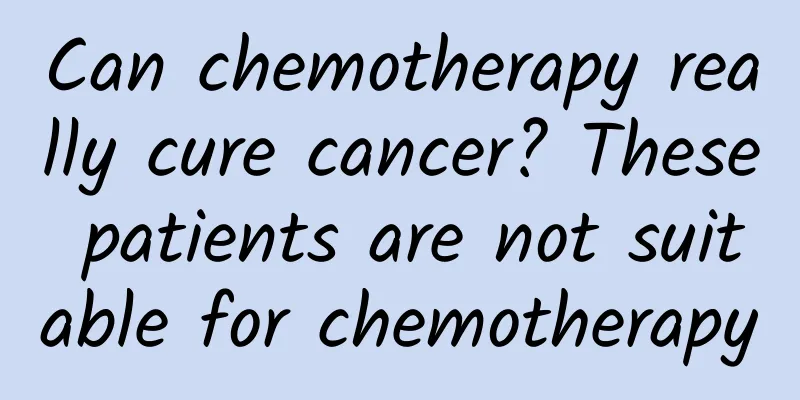Can chemotherapy really cure cancer? These patients are not suitable for chemotherapy

|
When it comes to chemotherapy Many people immediately think of the scene of losing all their hair. An instinctive resistance rises from the bottom of my heart There are also rumors that many cancer patients died from chemotherapy It seems that chemotherapy is more terrifying than cancer itself. So does chemotherapy have more benefits than disadvantages? Still more disadvantages than advantages Today we will make it clear once and for all 1. What is chemotherapy and which cancer patients are suitable for chemotherapy? Chemotherapy refers to a treatment using chemical drugs, which mainly involves injecting chemotherapy drugs into the patient's body through intravenous drip, intravenous injection, oral administration, etc. The drugs enter the blood circulation and reach the whole body, thereby inhibiting the growth of cancer cells in the body. Theoretically, chemotherapy is suitable for patients who have sensitive tumor cells in their body. The following are suitable for chemotherapy: (1) Tumors that are sensitive to chemotherapy, such as leukemia, multiple myeloma, malignant lymphoma and other blood system tumors, choriocarcinoma, testicular cancer, small cell lung cancer, etc. (2) Patients who have undergone surgical resection or local radiotherapy for solid tumors. (3) Patients with solid tumors that have extensive or distant metastasis and are not suitable for surgery or radiotherapy. (4) Neoadjuvant chemotherapy before surgery, using preoperative chemotherapy to shrink the lesions. 2. Why do we still need chemotherapy when we have targeted and immunotherapy? With the continuous progress and development of medicine, there have been great breakthroughs in the field of cancer treatment, and various targeted and immunotherapy "miracle drugs" have emerged one after another. However, not all cancers are suitable for targeted and immunotherapy, and not all patients can benefit from these treatments. Some cancer cells may not have obvious targets or are resistant to targeted drugs; some patients' immune systems may not be able to effectively recognize and attack cancer cells, or have adverse reactions to immune drugs. Therefore, chemotherapy remains a widely used cancer treatment modality. 3. What are the side effects of chemotherapy and how to avoid them? Chemotherapy does not specifically identify cancer cells like targeted drugs. While chemotherapy kills cancer cells, normal cells such as hematopoietic stem cells, germ cells, and intestinal mucosal cells are also seriously harmed, resulting in the following side effects. But don't worry too much, we can take measures to reduce side effects. (1) Digestive system reactions: such as nausea, vomiting, diarrhea and constipation. Nausea and vomiting are one of the most common side effects of chemotherapy. Strong antiemetics can be infused or taken to alleviate nausea and vomiting. (2) Myelosuppression: such as leukopenia and thrombocytopenia. Generally, the condition will recover on its own 1 to 2 weeks after stopping chemotherapy. Some patients with more severe myelosuppression can be effectively controlled by using drugs that increase leukocytes and platelets. (3) Hair loss: Some chemotherapy drugs may cause hair loss. Generally, the hair will grow back 1 to 3 months after stopping the drug. (4) Others: such as cardiac toxicity, liver and kidney damage, peripheral neurotoxicity, etc. Most chemotherapy side effects are reversible and can be controlled or alleviated through the use of some auxiliary drugs. In addition to the above-mentioned symptomatic treatment measures, patients also need to do the following to minimize the harm of side effects. (1) Develop psychological preparation In order to achieve dramatic prominence, some film and television works often exaggerate and demonize the side effects of chemotherapy, even to the point where people turn pale at the mention of it. In fact, chemotherapy drugs are changing, medical experience is constantly accumulating, and nursing levels are also improving. A scientific and complete treatment and prevention system has been formed to deal with chemotherapy side effects. Patients should understand and be familiar with the overall chemotherapy process, let go of their psychological burden, and face chemotherapy side effects positively with a healthy attitude. (2) Prevention before chemotherapy ① Actively cooperate with doctors to complete various routine examinations, such as blood routine, liver and kidney function, electrocardiogram, etc. Chemotherapy can only be carried out after all indicators meet the standards. ②Receive chemotherapy pretreatment on time according to the doctor's instructions. ③ Strengthen dietary care and eat easily digestible and nutritious food. (3) Prevention after chemotherapy ① Actively communicate with doctors and efficiently provide feedback on changes in side effects. ② Maintain good living habits, avoid going to crowded places and avoid infection. ③Proper exercise helps the body recover. At the same time, avoid strenuous exercise. ④If hair loss occurs, you can cut your hair short, reduce the number of times you comb your hair, and delay the hair loss period. ⑤Regularly review various indicators and monitor your body’s recovery. 4. Which cancer patients are not recommended to undergo chemotherapy? Chemotherapy also has contraindications. Chemotherapy is not recommended for the following patients: (1) Elderly and frail patients with poor nutritional status are unable to tolerate chemotherapy. (2) Dysfunction of important organs, such as severe dysfunction of the liver, kidney, heart, lung, and bone marrow. (3) Patients with serious infectious diseases such as chickenpox and herpes zoster, as well as those who are allergic to chemotherapy drugs. (4) Use with caution in pregnant or lactating women. (5) Mental patients and others who are unable to cooperate with treatment. summary: In fact, doctors will conduct a comprehensive and scientific assessment of the patient's condition before chemotherapy, and then combine the wishes of the patient and his family to make the final decision on whether to undergo chemotherapy. Therefore, thousands of words can be summed up in one sentence: listen to the doctor ! In short, compared to the disease itself, chemotherapy is not terrible, and its side effects are completely preventable and controllable . Don't give up treatment for fear of side effects. If you refuse chemotherapy because of fear of side effects, it will be more harm than good. |
>>: Why are sweet potatoes more fragrant and sweeter when roasted?
Recommend
Where should I apply moxibustion if I don't have my period?
Irregular menstruation is a common physical probl...
Burning sensation in the vagina
Many women experience a burning sensation in the ...
How to supplement calcium for 40-year-old women
After a woman reaches the age of 40, her body fun...
What happens if there is yellowish-brown mucus down there during pregnancy?
Women face greater physical challenges during pre...
What is the origin of eating mooncakes during the Mid-Autumn Festival? What is the best gift for your girlfriend during the Mid-Autumn Festival?
The word mooncake was first seen in the Dreams of...
What should I do about premenstrual dysphoria?
Every woman has her period every month. Before he...
How to adjust after miscarriage? Pay attention to a reasonable diet
A woman's body is relatively weak after misca...
OpenSignal: 2013 Android Fragmentation Report: Illustrated Explanation of Ecosystem Fragmentation
The fragmentation of Android has promoted the exp...
Is bleeding normal after cervical erosion surgery?
I believe everyone is familiar with the symptoms ...
Can moxibustion cure postpartum wind?
Many people do not pay much attention to their ph...
How to treat moderate chronic cervicitis with physical therapy?
Chronic cervicitis is a common disease among wome...
What to eat when you are seven months pregnant
As a woman, the happiest and most joyful time in ...
Food Safety Tips for the 2025 Snake Spring Festival
Five things to do for safe eating There are five ...
Red spots on breasts
Breasts are a very important sexual organ for wom...
Healthy Life from Oil | Will unreasonable intake of edible oil have an impact on our health?
Among the many food elements, oil has the greates...









